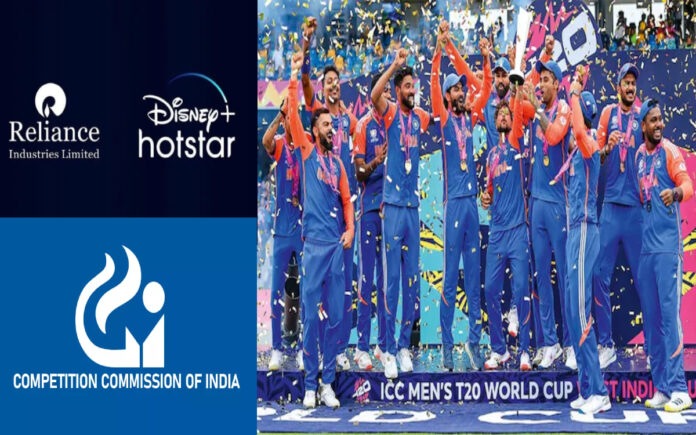New Delhi: The Competition Commission of India (CCI) has expressed concerns over the proposed $8.5 billion merger of Walt Disney’s and Reliance’s Indian media assets, potentially forcing the companies to address issues related to cricket broadcast rights or implement advertising price caps.
According to Reuters, the CCI has issued a warning notice indicating that the merger could result in a monopoly over cricket broadcast rights, valued at billions of dollars, thereby allowing the merged entity to exert undue pressure on advertisers. Both the companies and the regulator have yet to comment publicly, as the process remains confidential.
Disney and Reliance aim to form India’s largest entertainment conglomerate, set to rival competitors like Sony, Netflix, and Amazon, with a portfolio of 120 TV channels and two streaming services. Cricket, with its immense following in India, stands as a significant asset in this deal.
To secure approval, the companies may need to implement structural changes or behavioral remedies. This could involve divesting certain broadcast rights or agreeing to regulatory measures that address antitrust concerns. They might opt to sell rights for specific cricket tournaments or distribution platforms such as TV or streaming services.
Recent investments by Reliance and Disney amount to approximately $9.5 billion for TV and streaming rights related to major cricket events, including the Indian Premier League, International Cricket Council tournaments, and matches organized by the Indian cricket board.
Another possible solution is to cap advertisement rates for cricket matches temporarily, ensuring fair pricing and protecting advertisers’ interests. “What they can offer is that the rates will be fair, reasonable and non-discriminatory, or that they will not increase the rate beyond a certain percentage which accounts only for inflation,” explained Rahul Rai, a partner at Axiom5.
Disney, Reliance, and the CCI have not responded to requests for comment. The companies previously assured the regulator that the rights would not adversely affect advertisers and would expire by 2027-28, allowing competitors to bid for them thereafter.
Cricket rights are pivotal to the merger. Both companies have used free match broadcasts to attract users to their streaming platforms, hoping to convert them into paying subscribers. One lawyer noted that without cricket rights, “the deal is dead”.
Also Read | Nearly Three Million Affected by Bangladesh Floods; Two Confirmed Dead
The merged Disney-Reliance entity would also hold Indian broadcast rights for other major sporting events, including Wimbledon, MotoGP, and the English Premier League. According to media agency GroupM, nearly $2 billion was spent on sports-related sponsorships and media in India in 2023, with cricket accounting for 87% of that expenditure.
Reliance has proposed selling fewer than 10 TV channels, mostly in regional languages, to appease the CCI but has resisted changes to cricket rights, a stance that has drawn regulatory scrutiny. Kanika Chaudhary Nayar, an antitrust partner at DSK Legal, suggested that selling sports channels not focused on cricket might address some concerns while preserving cricket-related revenue.
Also Read | Indonesia Lawmakers Halt Election Law Changes Amid Widespread Protests
If the CCI remains unsatisfied with the companies’ proposals, it may conduct a more detailed review of the merger, potentially delaying approval. An industry source indicated that Disney is still hopeful of securing approval without having to divest cricket rights.
K.K. Sharma, a former head of mergers at the CCI, noted that an approved deal would create “a big fish in the broadcasting market … and a practical monopoly on cricket advertisement revenues,” giving the new entity a clear dominant position.



